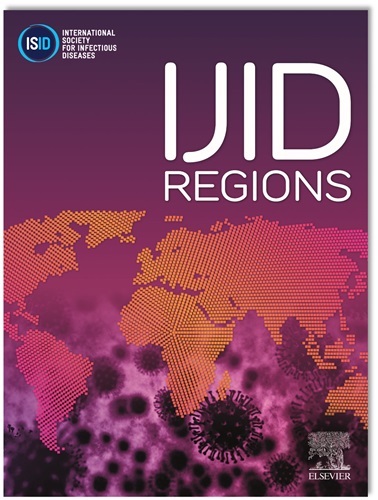严重侵袭性感染与新型 IRAK2 免疫变异有关。
IF 4.8
2区 医学
Q1 INFECTIOUS DISEASES
引用次数: 0
摘要
在对常见化脓性细菌的严重感染具有特殊易感性的受试者中,发现了白细胞介素-1受体相关激酶蛋白(IRAK)1和IRAK4的突变。IRAK 激酶是病原体识别受体激活后的下游信号转导物。在两名连续或反复发生侵袭性感染的患者(分别是单纯疱疹病毒引发的嗜血细胞淋巴组织细胞增多症合并结核病患者和肺炎链球菌菌血症合并念珠菌血症患者)中,发现了IRAK2的新型突变。这些突变损害了泛素化(或功能修饰)信号适配器肿瘤坏死因子受体相关因子 6(TRAF6)的能力。其结果是细胞因子 TNF-α 的产生受到损害。这种对各种病原体的易感性突显了 IRAK2 在传染性疾病中介导宿主防御的潜在核心作用。本文章由计算机程序翻译,如有差异,请以英文原文为准。
Severe invasive infections linked to IRAK2 immune variants
In subjects with peculiar susceptibility to severe infections by common pyogenic bacteria, mutations of interleukin-1 receptor-associated kinase proteins (IRAK)1 and IRAK4 had been identified. The IRAK kinases function as downstream signal transductors following the activation of pathogen recognition receptors. In two patients with sequential or repeated invasive infections: herpes simplex virus-triggered hemophagocytic lymphohistiocytosis with tuberculosis, and Streptococcus pneumoniae bacteremia with candidemia respectively, novel mutations of IRAK2 were identified. These mutations compromised the capacity to ubiquinate (or functionally modify) the signal adaptor tumor necrosis factor receptor-associated factor 6. The result is impairment of the cytokine tumor necrosis factor-alpha production. This susceptibility to a varied range of pathogens underlines a potential central role played by IRAK2 in mediating host defense in infectious diseases.
求助全文
通过发布文献求助,成功后即可免费获取论文全文。
去求助
来源期刊
CiteScore
18.90
自引率
2.40%
发文量
1020
审稿时长
30 days
期刊介绍:
International Journal of Infectious Diseases (IJID)
Publisher: International Society for Infectious Diseases
Publication Frequency: Monthly
Type: Peer-reviewed, Open Access
Scope:
Publishes original clinical and laboratory-based research.
Reports clinical trials, reviews, and some case reports.
Focuses on epidemiology, clinical diagnosis, treatment, and control of infectious diseases.
Emphasizes diseases common in under-resourced countries.

 求助内容:
求助内容: 应助结果提醒方式:
应助结果提醒方式:


